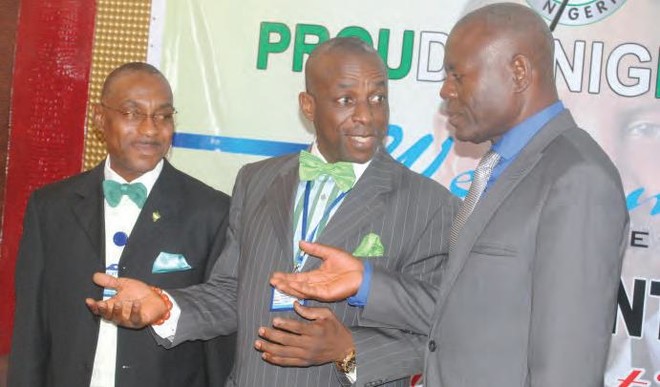Dangote Group implementing $20bn 10yr expansion programme; 6 projects to generate $15bn annually
The Dangote Group is in the thick of executing six major projects that are estimated would generate foreign exchange earnings of about $15 billion annually for Nigeria and provide hundredsof thousands of jobs over a 10-year period. The President of the Group, Aliko Dangote, had disclosed last year that the company was investing a total […]


The Dangote Group is in the thick of executing six major projects that are estimated would generate foreign exchange earnings of about $15 billion annually for Nigeria and provide hundredsof thousands of jobs over a 10-year period.
The President of the Group, Aliko Dangote, had disclosed last year that the company was investing a total of $20bn on the key projects. The projects cover refinery and petrochemicals, sub-sea gas pipeline, fertilizer, local rice production, local sugar production and cement capacity expansion. The list excludes Dangote’s huge investment in tomato farming and processing, which the Vice-President of the Dangote Industries Limited, Sani Dangote, recently said would contribute greatly in helping Nigeria save about N52bn the country spend annually on importing 150,000 metric tonnes (mt) of tomato concentrate. Work is going on at a fast pace at the $12bn Dangote refinery and petrochemical project in Lagos, a key component of the Dangote Group 10-year expansion programme. The refinery will boast a capacity to process 650,000 barrels of crude per day (bpd). The refinery project is expected to become operational in the first quarter of 2019 and create a minimum of new 235,000 direct and indirect jobs. The hope is wide that the refinery would ensure fuel sufficiency for Nigeria and save the country millions of dollars spent on importing refined petroleum products every year.
There is also the petrochemical plant that is being built to be producing 1.3m metric tonnes of polypropylene and polyethylene every year, as well as the fertilizer project under construction at a cost of $2bn to produce 2.8m tons of urea per year. The fertiliser project, Aliko Dangote had enthused, would contribute to national food security and sufficiency for Nigeria. A major investment Dangote Industries Limited is involved in is the East-West Offshore Gas Gathering Pipeline System, simply known as EWOGGS. The EWOGGS project is described as the single largest gas infrastructure investment in Nigeria’s history and is expected to extensively benefit domestic gas demand. The EWOGGS pipeline is designed to connect the gas resources in the East to the domestic gas demand in the
West through a three billion cubic feet per day (bcf/d) openaccess offshore gas pipeline system. The system will have provisions for seven offshore gas injection connection points and two offshore gas discharge connection points. The project is scheduled to be completed by 2018. “The EWOGGS pipeline project, on which $3b will be sunk and located near Bonny Island to Lekki Free Trade 4 zone, will unlock significant gas supply for industry and supply gas to generate 12,000 megawatts of power,” Dangote disclosed. He said gas from the gas pipeline project could supply fuel to central power plants to generate electricity for households and Nigeria would save over $7.5b for Nigeria annually, through import substitution. The Dangote Group is also engaged in a fully integrated rice production and processing operation that boasts two rice mills of 240,000mt per season and two crop seasons in a year. With an installed capacity to produce 960,000mt of milled rice per annum, Dangote calculated the project would meet 16 per cent of Nigeria’s rice needs. The $1bn rice projects will cover 150,000 hectares of land across Adamawa, Edo, Jigawa, Kano, Kebbi, Kogi, Kwara, Nasarawa, Niger, Sokoto, Taraba and Zamfara states. Forty per cent of paddy rice will be provided by the Dangote Rice Outgrower Scheme. Dangote was optimistic his $1bn sugar backward integration project would ensure self-sufficiency in sugar. The sugar projects cover 150,000 hectares across Adamawa, Sokoto, Kebbi, Jigawa, Taraba, Kogi and Kwara states and will produce 1.5m metric tonnes of refined sugar per annum. The project is in two phases to be executed over the next 10 years. Dangote Cement has already made a firm statement in local production and is now exporting bags of the product. Its capacity expansion has been a continuous process, and it now speaks of an established presence in some 19 countries of the world. Dangote aims at driving the company to be the sixth largest cement producer in the world by 2019 with 77m mtpa capacity across board.
To the industrious industrialist, the method to his long-term designs was that Nigeria must drastically reduce imports if it must develop. To that effect, he is committed to investing huge sums in any sector that requires the country to produce locally. He stressed that Nigeria had no business importing products which it has the raw materials to produce. Saying he would soon delve into milk production, he lamented 80 per cent of milk consumed in Nigeria was imported, a situation he described as “unacceptable”, as he strongly argued Nigeria could produce the amount of milk it needed.
The Group Executive Director, Stakeholders Management and Corporate Communications of Dangote Industries Limited, Ahmed Mansur, once told journalists that Dangote was determined to reduce capital flight from Nigeria and boost the inflow of foreign exchange, hence his multidirectional approach to manufacturing and local production generally. “Dangote Industries plans to bring $6 to $10 billion every year for the country when the injection of funds and expansion programme is completed,” Mansur explained
